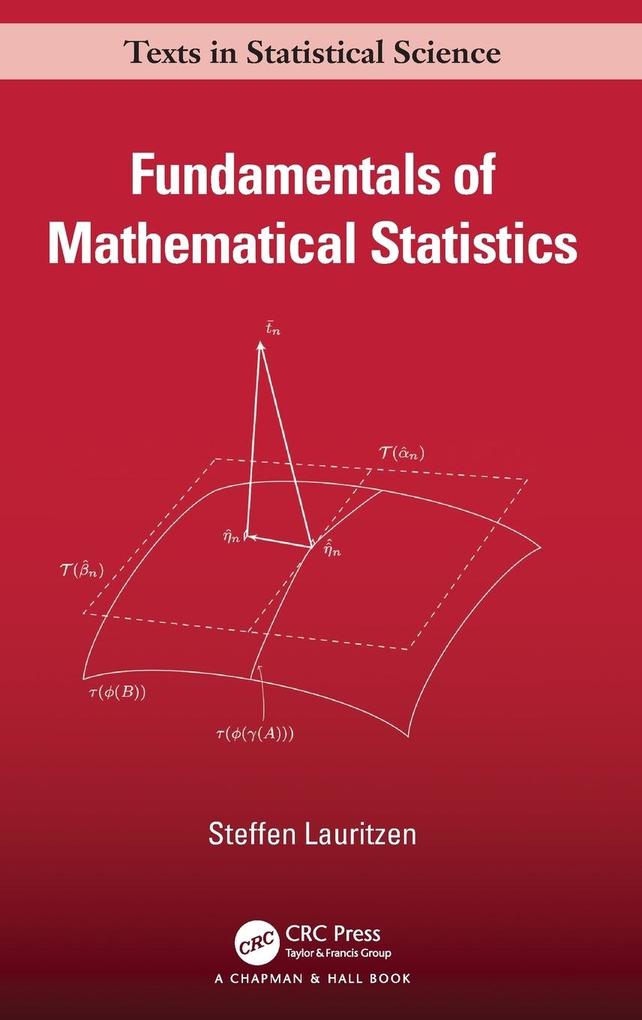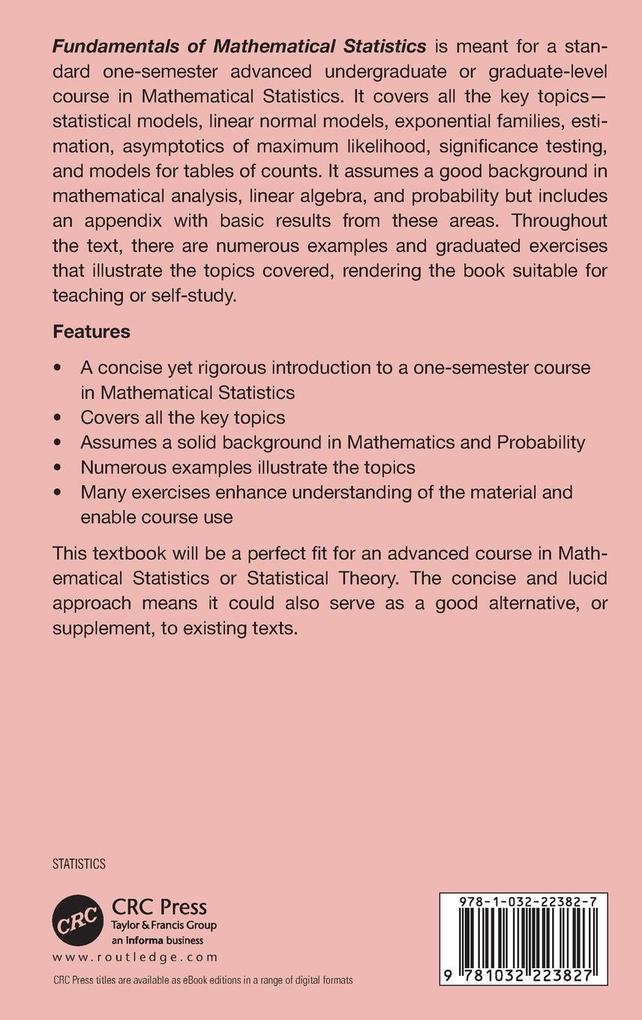
Zustellung: Fr, 18.07. - Di, 22.07.
Versand in 7 Tagen
VersandkostenfreiBestellen & in Filiale abholen:
This books is meant for a standard one-semester advanced undergraduate or graduate level course on Mathematical Statistics. It covers all the key topics - statistical models, linear normal models, exponential families, estimation, asymptotics of maximum likelihood, significance testing, and models for tables of counts.
Fundamentals of Mathematical Statistics is meant for a standard one-semester advanced undergraduate or graduate-level course in Mathematical Statistics. It covers all the key topics-statistical models, linear normal models, exponential families, estimation, asymptotics of maximum likelihood, significance testing, and models for tables of counts. It assumes a good background in mathematical analysis, linear algebra, and probability but includes an appendix with basic results from these areas. Throughout the text, there are numerous examples and graduated exercises that illustrate the topics covered, rendering the book suitable for teaching or self-study.
Features
- A concise yet rigorous introduction to a one-semester course in Mathematical Statistics
- Covers all the key topics
- Assumes a solid background in Mathematics and Probability
- Numerous examples illustrate the topics
- Many exercises enhance understanding of the material and enable course use
This textbook will be a perfect fit for an advanced course in Mathematical Statistics or Statistical Theory. The concise and lucid approach means it could also serve as a good alternative, or supplement, to existing texts.
Inhaltsverzeichnis
1. Statistical Models. 1. 1. Models and parametrizations. 1. 2. Likelihood, score, and information. 1. 3. Exercises. 2. Linear Normal Models. 2. 1. The multivariate normal distribution. 2. 2. The normal distribution on a vector space. 2. 3. The linear normal model. 2. 4. Exercises. 3. Exponential Families. 3. 1. Regular exponential families. 3. 2. Examples of exponential families. 3. 3. Properties of exponential families. 3. 4. Constructing exponential families. 3. 5. Moments, score, and information. 3. 6. Curved exponential families. 3. 7. Exercises. 4. Estimation. 4. 1. General concepts and exact properties. 4. 2. Various estimation methods. 4. 3. The method of maximum likelihood. 4. 4. Exercises. 5. Asymptotic Theory. 5. 1. Asymptotic consistency and normality. 5. 2. Asymptotics of moment estimators. 5. 3. Asymptotics in regular exponential families. 5. 4. Asymptotics in curved exponential families. 5. 5. More about asymptotics. 5. 6. Exercises. 6. Set Estimation. 6. 1. Basic issues and definition. 6. 2. Exact confidence regions by pivots. 6. 3. Likelihood based regions. 6. 4. Confidence regions by asymptotic pivots. 6. 5. Properties of set estimators. 6. 6. Credibility regions. 6. 7. Exercises. 7. Significance Testing. 7. 1. The problem. 7. 2. Hypotheses and test statistics. 7. 3. Significance and p-values. 7. 4. Critical regions, power, and error types. 7. 5. Set estimation and testing. 7. 6. Test in linear normal models. 7. 7. Determining p-values. 7. 8. Exercises. 8. Models for Tables of Counts. 8. 1. Multinomial exponential families. 8. 2. Genetic equilibrium models. 8. 3. Contingency tables. 8. 4. Exercises.
Mehr aus dieser Reihe
Produktdetails
Erscheinungsdatum
17. April 2023
Sprache
englisch
Seitenanzahl
260
Reihe
Chapman & Hall/CRC Texts in Statistical Science
Autor/Autorin
Steffen Lauritzen
Verlag/Hersteller
Produktart
gebunden
Abbildungen
34 SW-Abb., 34 SW-Zeichn., 3 Tabellen
Gewicht
558 g
Größe (L/B/H)
240/161/19 mm
ISBN
9781032223827
Entdecken Sie mehr
Bewertungen
0 Bewertungen
Es wurden noch keine Bewertungen abgegeben. Schreiben Sie die erste Bewertung zu "Fundamentals of Mathematical Statistics" und helfen Sie damit anderen bei der Kaufentscheidung.


































